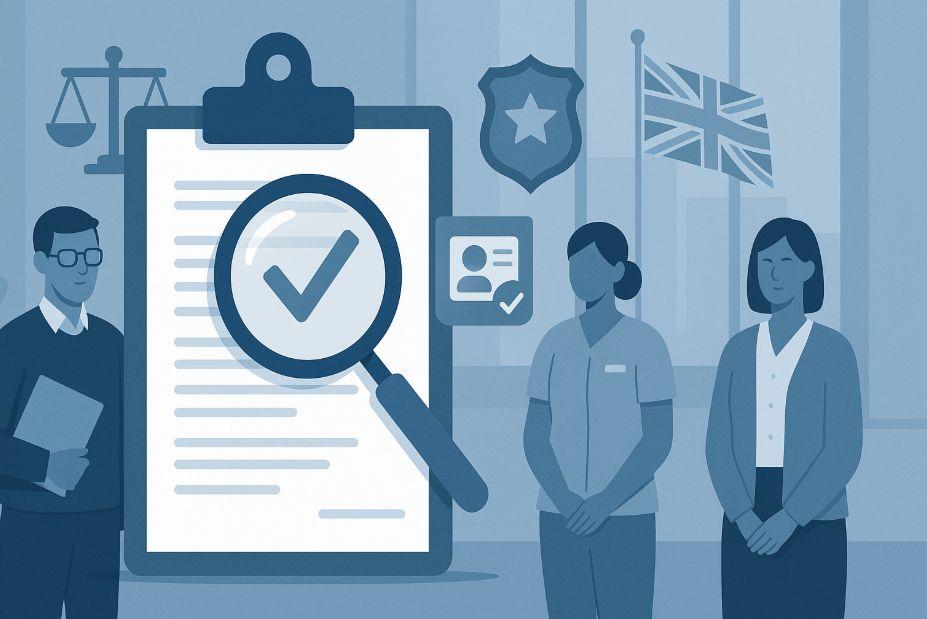The Criminal Records Bureau (CRB) was introduced in 2002 to help employers make safer hiring decisions by checking the criminal background of job applicants. Its core function was to issue certificates that listed any criminal convictions, cautions, or warnings recorded against an individual.
Over time, the system was criticised for inefficiencies, overlap with other vetting authorities, and limited scope. In 2012, the government decided to consolidate CRB functions with the Independent Safeguarding Authority (ISA), forming the Disclosure and Barring Service (DBS).
This unified body now manages both criminal record disclosures and decisions about who should be barred from working with vulnerable groups.
How Does the Disclosure and Barring Service (DBS) Work Today?

The DBS continues to support public protection by helping employers identify individuals who may be unsuitable for specific roles. It collaborates with local police forces, government departments, and other stakeholders to gather and assess criminal information.
Unlike the CRB, the DBS has a dual role: it provides disclosure certificates (similar to CRB checks) and maintains two barred lists one for children and another for vulnerable adults. These lists are used to prevent individuals with serious convictions or misconduct from entering professions where they might pose a risk.
What Are the Different Types of DBS Checks in the UK?
Understanding the levels of DBS checks is crucial for both employers and applicants. Each level offers a different depth of information depending on the nature of the role.
Types of DBS Checks
| Type of DBS Check | Information Included | Eligibility | Common Uses |
| Basic | Unspent convictions only | Open to anyone for any purpose | Self-employed workers, visa applications |
| Standard | Spent and unspent convictions, cautions, reprimands, warnings | Requested by employers | Legal, financial, and regulated industry roles |
| Enhanced | All of the above plus local police intelligence | For roles in regulated activity | Teachers, healthcare workers, social workers |
| Enhanced with Barred Lists | Enhanced check plus check against children or adult barred list | Required by law for regulated activity | Nurseries, care homes, schools |
Employers must determine which level is legally appropriate before requesting a check.
Who Needs a Criminal Records Bureau (CRB) or DBS Check in London?
In London’s densely populated and professionally diverse environment, DBS checks are particularly common in sectors involving public safety or trust. Education and healthcare professionals are among the most frequently vetted, along with social workers, public transport drivers, and charity volunteers.
Jobs that fall under the term “regulated activity” typically roles involving frequent, unsupervised contact with children or vulnerable adults legally require an enhanced DBS check. Even certain freelance and contract positions may demand a background screening depending on the nature of the work and the organisation’s safeguarding responsibilities.
How Can Employers Request a CRB or DBS Check?

Employers in the UK cannot directly request a DBS check unless they are a registered body. If they are not, they must use an umbrella body, which acts as an intermediary.
The process begins with the employer identifying the level of check required. Once confirmed, the applicant completes a DBS form and submits their identity documents. The umbrella body or registered organisation then submits this application to the DBS. Once processed, a certificate is issued to the applicant, who may choose to share it with the employer.
It’s important to note that only the applicant receives the physical DBS certificate. Employers are not automatically sent a copy and must rely on the applicant to provide it for review.
How Long Does a CRB or DBS Check Take to Complete?
The time it takes to complete a DBS check varies based on the type of check and external factors such as police response times and application accuracy.
A basic check is typically completed within 1 to 5 working days, while standard checks may take up to 10 days. Enhanced checks, which require input from multiple police forces, may take up to 4 weeks or longer.
Delays often occur due to incomplete information, inaccurate documentation, or during peak recruitment seasons. Applicants are encouraged to use the DBS tracking system to monitor progress.
What Are the Costs Associated With CRB or DBS Checks?
Fees for DBS checks are standardised but can vary when processed through private umbrella bodies due to administrative charges.
DBS Check Fee Structure (2025)
| Check Type | Government Fee | Volunteer Rate | Typical Umbrella Fee |
| Basic DBS Check | £18 | Not applicable | £23 – £30 |
| Standard DBS Check | £18 | Free | £25 – £35 |
| Enhanced DBS Check | £38 | Free | £40 – £60 |
For volunteers, DBS checks are free, provided the position qualifies as unpaid and benefits the community.
How Can Individuals Apply for Their Own DBS Check in the UK?

Individuals can only apply for a basic DBS check directly, which is useful for freelance work, visa applications, or personal awareness. This can be done online via the official GOV.UK platform. The application requires proof of identity, address history for the past five years, and payment of the standard fee.
Standard and Enhanced checks must be requested by an employer or an authorised organisation due to legal restrictions on who can access sensitive criminal record data.
What’s the Difference Between a CRB Check and a DBS Check?
The main difference is that CRB checks are no longer issued. Since 2012, all criminal record disclosures in the UK are handled by the Disclosure and Barring Service.
While CRB checks focused solely on disclosing information, DBS checks include both disclosure and barring functions. Additionally, DBS checks are supported by more advanced digital infrastructure and filtering guidelines that did not exist under the CRB system.
How Can You Check the Status of Your DBS Application?
Applicants can check the status of their DBS application using the online tracking tool on the DBS website. They’ll need to enter a unique application reference number and date of birth. This tool provides real-time updates through the various stages: application received, processing, police check, and certificate issued.
If delays exceed expected timelines, applicants may contact DBS customer support for investigation.
What Are Common Misconceptions About Criminal Record Checks in the UK?
One common myth is that all convictions show up on a DBS check. In reality, minor and historical offences may be filtered out under the Rehabilitation of Offenders Act 1974. Another misunderstanding is that a clean certificate guarantees a person’s character; the check is only one part of the wider safeguarding process.
Many also mistakenly believe DBS checks are required for all roles, but they are legally restricted to specific positions where there is a genuine need for criminal record information.
How Secure and Confidential Is the DBS Checking Process?
DBS checks are handled with a high level of confidentiality and adhere to GDPR regulations. All data is encrypted and securely stored. The DBS does not share certificate results directly with employers unless the applicant provides consent. Employers are legally required to store this information securely and may not retain it longer than necessary.
How Does a DBS Check Affect Employment Opportunities in London?
In competitive job markets like London, a DBS check can either support or hinder job prospects depending on its content. For roles in education, healthcare, and social services, a positive certificate may lead to disqualification. However, many employers apply a case-by-case approach, especially if the offence is minor, outdated, or unrelated to the job.
The Ban the Box campaign encourages employers to remove criminal record questions from job applications, giving people with convictions a fairer chance.
What Are the Alternatives to DBS Checks for International Applicants?

Applicants who have spent time outside the UK may need to provide additional documentation, as DBS checks only cover UK criminal records. Alternatives include:
- Police clearance certificates from the applicant’s country of origin
- Certificates of Good Conduct issued by embassies
- International criminal background checks conducted through private agencies
Employers should always verify the authenticity and completeness of overseas documents.
How Can Organisations Stay Compliant With UK Vetting Laws?
Compliance involves more than just requesting DBS checks Organisations must:
- Understand which roles require checks
- Handle DBS data securely and responsibly
- Train HR staff in safeguarding and legal responsibilities
- Develop a clear policy on handling positive disclosures
Failing to comply can result in legal penalties, loss of trust, and serious safeguarding risks.
Conclusion
Though the Criminal Records Bureau no longer operates, its impact is still felt in the DBS system used today. Understanding how background checks work is essential for both employers and job seekers, especially in a city like London where safeguarding, compliance, and trust are paramount. The DBS is more than just an administrative formality it’s a vital tool for building safe and responsible communities.
FAQs About CRB and DBS Checks in the UK
Can I still apply for a CRB check in the UK?
No, CRB checks were phased out in 2012. All background checks are now processed through the DBS.
Is it illegal to work without a DBS check in some roles?
Yes, working in regulated activity without a valid DBS check can result in legal action against both the individual and employer.
How often should a DBS check be renewed?
There is no fixed renewal period, but employers typically request a new check every 1 to 3 years depending on their policy.
Will a criminal record always prevent employment?
Not necessarily. Many employers consider the nature, severity, and age of the offence before making a decision.
Can I challenge incorrect information on my DBS certificate?
Yes, disputes can be raised through the DBS disputes process if you believe the certificate contains errors.
What is the DBS Update Service?
It’s an annual subscription that lets you keep your certificate up to date and share it with employers without reapplying.
Are there any positions exempt from DBS checks despite public interaction?
Yes, many roles involving public interaction, such as retail or hospitality, do not legally require DBS checks.









Leave feedback about this